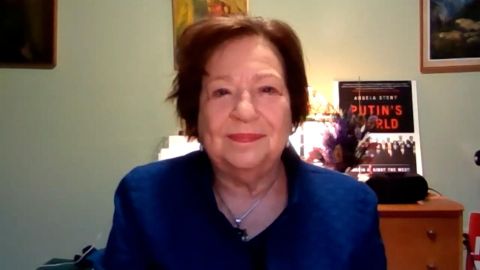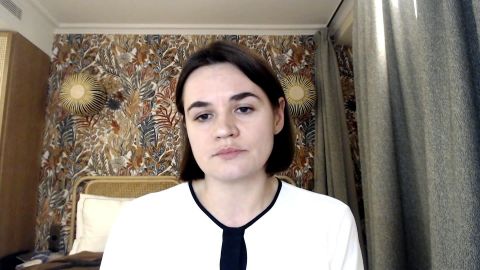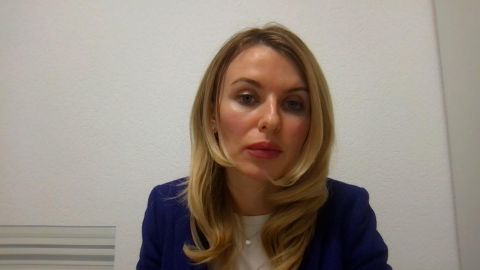Read Transcript EXPAND
CHRISTIANE AMANPOUR: And next, in 2019, the renowned foreign policy expert Angela Stent wrote a book entitled “Putin’s World,” and it looks at how the dictator created a paranoid and polarized world view. Now her latest article in “Foreign Affairs” outlines what she calls the Putin doctrine, getting the West to treat Russia as if it were the Soviet Union, a power to be respected and feared. Stent sat down with Walter Isaacson to discuss what she meant by this and much more on the crisis in Ukraine.
(BEGIN VIDEOTAPE)
WALTER ISAACSON: Thank you, Christiane. And, Dr. Angela Stent, welcome to the show. You wrote a really prescient article in “Foreign Affairs” a couple of months ago called “Putin’s World” or “Putin’s Doctrine.” And you said that making a move on Ukraine was always part of the plan. Why is that?
ANGELA STENT, DIRECTOR, CENTER FOR EURASIAN, RUSSIAN AND EAST EUROPEAN STUDIES, GEORGETOWN UNIVERSITY: It’s because Putin believes that, in the 1990s, a Euro-Atlantic security system was set up that was disadvantageous to Russia, because he believes that the collapse of the Soviet Union, as he has said, was the greatest geopolitical catastrophe of the 20th century. He believes that Russia has a right to dominate the countries in its neighborhood, to a sphere of influence. And so he’s really been determined really. He’s been president for 22 years. He’s seen five U.S. presidents come and — well, he’s on fifth now. And he decided that, at this point, this was the time to strike. And he apparently sincerely believes that Russia can only exist as a great power if it can dominate its neighborhood, and particularly if it can dominate Ukraine.
ISAACSON: In “Putin’s World,” your book, you talk about how Russia was able to reemerge, even despite its really bad economy. How did Putin play such a poor hand so well?
STENT: So, Putin is trained, first of all, as a KGB case opposite. And, secondly, he was a judo champion in his youth. And so he has been very adept at taking advantage of the weakness, the distraction of his opponents, as he sees them, of a distracted West, even though Russia was much weaker, and he seized opportunities where he saw them. And he has now — Russia has now gone back to parts of the world from which it withdrew after the Soviet collapse, and it’s rebuilt its military. And even though, of course, it’s much weaker than the United States, it can still dominate its neighborhood. And it can certainly project power beyond that.
ISAACSON: You’re on the senior advisory committee of the NATO Supreme Command. You advised them for a while. How effectively do you think NATO has responded?
STENT: I think NATO was responding quite effectively now. I think people have been surprised by how unified NATO was. And when I was on the senior advisory panel, particularly to General Breedlove — and this was during the Obama administration — I think that he was frustrated after 2014, when Russia annexed Crimea and began this war in southeastern Ukraine. He was frustrated that NATO didn’t do more, that the U.S. didn’t do more. And I think, this time, some lessons have been learned from that. At least NATO has presented a united front. And we have — are now sending thousands and thousands more troops back in — not only to Europe, but particularly to those front-line NATO members who — which border Ukraine. So there is a show of strength there. And I think one of the dangers of this ongoing war is that it could inadvertently spread beyond Ukraine to some of its neighbors that are NATO members. And that would, of course — that you would create a situation where NATO and Russia would be directly confronting each other, which is an extremely dangerous thing to ponder.
ISAACSON: Well, that’s pretty shocking. You think that this could go into Poland or someplace like that?
STENT: I think not deliberately. But once wars break out — and we now the Russians closing on Kyiv — would there be a cyberattack that would affect Poland? Would that be some inadvertent incident which could affect these NATO members? And I think everyone’s very aware about this now. And they clearly don’t want this to happen. But NATO is now reinforced. I mean, ironically, of course, Vladimir Putin has given NATO yet another purpose. After the withdrawal from Afghanistan, there was a question, what does NATO do next? The withdrawal, as we know, was quite chaotic. And the answer is, NATO goes back to its original mission, which is to contain — it was then the Soviet Union, and now Russia.
ISAACSON: You said that he’s dissatisfied with the world order. That happened after the collapse of communism and the end of the Cold War. And one of the things that happened, especially in the past 20 years, has been the expansion of NATO. It expanded into Poland and to the Czech Republic, and now even to the Baltic states and Romania. Was that a mistake?
STENT: Well, you have to go back to the early 1990s, in the Clinton administration. The Soviet Union had collapsed. The Warsaw Pact collapsed. And you had all of these countries in Central Europe, some of whom had territorial claims against each other, for instance, Hungary and Romania. These countries had not known sort of democracy since the 1930s or before. And there was real concern about what would happen to them. And, of course, they had had centuries of domination, either by Russia or by the Soviet Union. So, the Clinton administration made the decision to use NATO, which was a successful institution, to order really European security. And they decided not to sort of abandon NATO and create some new all- European structure, although some people wanted it at the time. But that was their choice. And they also offered Russia a special relationship with NATO, the NATO-Russia Council. But, of course, the problem with that system was that Russia never really had a stake in it. And then you had the original enlargement of NATO to Poland, the Czech Republic and Hungary, and then, in 2004, to a larger number of countries, including the three Baltic states. But, at the time, even in 2004, Putin didn’t really object. The Russians weren’t thrilled about it. So, some of the narrative that you hear now, that NATO is a major threat to Russia, is something that has really been there, well, certainly since 2007, when Putin made his infamous speech at the Munich Security Conference and accused the United States of trying to dominate the world in a nefarious way. So, we come back to the question, could it have been done otherwise? But at the time, I don’t think anyone had the stomach after this upheaval through the collapse of collapse of communist to create an entirely new organization for European security, which would have included Russia as a full member.
ISAACSON: But, you know, Russia has been attacked, at least, two or three times in the past century from the West. You go back to Napoleon. It’s always being attacked from the West. Is it unreasonable for Putin and Russians to want a security corridor of, at least, neutral nations on their border?
STENT: You know, in the 20th century, yes. Russia was invaded twice by Germany. The Soviet Union lost 27 million people in World War II, which was, you know, obviously, it left it with feeling very vulnerable. You know, when you look at Russia today, it’s the nuclear superpower. It’s an energy superpower. It’s a geographic superpower. None of its neighbors would have the capacity to invade Russia or attack it, they’re all much weaker. And the United States and Russia, which have never been at war with each other, United States would never think about attacking or invading Russia because we’re both nuclear superpowers and the result would be — could be Armageddon. So, if you look at the reality, it’s hard to understand why Russia believes that today, again, in the 21st century needs buffer states. On the other hand, those historical perceptions and memories, of course, run very deep.
ISAACSON: Everything you said makes it seem like this invasion was in inevitable. Was there anything we could have done, the West could have done, or some arrangement we could have made that would have prevented what’s happened in the past week?
STENT: I mean, it’s hard to say. On the one hand, I would go back to the 2008 NATO Bucharest Meeting. Now, at that meeting, the Bush administration really wanted its allies to provide Ukraine and Georgia with a membership action plan, which is a preliminary agreement which eventually does lead to membership. And the major NATO allies, France, Germany, were very much against that, precisely because they thought it would provoke Russia. And so, in a very hastily profit (ph) compromise, the communique from that summit says, Ukraine and Georgia will join NATO. But there is no timetable. There was never any plan. Since 2008, no steps have been taken to give either Georgia or Ukraine a membership action plan. And of course, it was at that summit that Putin then attended the next day, the only NATO summit he’s ever attented, and he said to President Bush, you have to realize, George, Ukraine isn’t even a country. Most of it belonged to Russia. And the Western part of it was given to us after World War II. So, I think that was a mistake. It was a mistake to have that clause in there, that sentence, which the Russians can then point to and say, Ukraine’s going to join NATO. And the NATO can say, yes, but that’s all very vague and it’s in the future. So, I think this was a mistake. I still think that Russia under Putin would have wanted to dominate Ukraine even absent of the NATO question. But certainly, having that sentence there has made it easier for Russia to justify what it’s doing there.
ISAACSON: Could this have been resolved recently, or could it even be resolved now if there were just a clear statement that Ukraine is not our candidate for NATO membership?
STENT: I do not believe that that really would have staved off the Russian attack. Don’t forget, in the two treaties that were presented to the United States and NATO in December of last year, Russia demanded not only that NATO not expand anymore but that it withdraw to the military posture of 1997. In other words, all of the new members of NATO, starting with the 1999 enlargement, would no longer have had any, you know, military connection really to NATO. So, you know, the U.S. and NATO, we did respond. We made a lot of offers to negotiate with Russia about issues that do concern Russian security, having to deal with missile defense and troop deployments in Central Europe, confidence building measures, a number of other things. And the Russians rejected them because we had rejected their major demand. Maybe if the — you know, NATO would have said, NATO will never enlarge anywhere, it wasn’t only about Ukraine, it was to say never — there will be no more enlargement to include, for instance, both Sweden and Finland, who would like to keep that question open. Maybe that would have stopped Russia from doing what it’s doing. But I — if — as I believed that Putin is relaying is to have a subservient Ukraine, Russia probably would have gone ahead and done this anyway. It was planning — it’s been planning to do this at least, what, from U.S. intelligence says really beginning in March of 2021.
ISAACSON: So, if Russia is able to install a puppet government in Kyiv, how does that play out?
STENT: Well, you know, talking to Ukrainian friends and colleagues, the majority of Ukrainians do not want to be under Russia’s thumb, even those in the East, even those who speak Russian. And they want to have an independent and a free Ukraine. So, there will be resistance. An insurgency is difficult in a country like Ukraine who is flat. There aren’t any mountains in the (INAUDIBLE) and, you know, it would be hard to carry out such an insurgency. But people believe there will be resistance. And so, it’s hard to see how this plays out. But of course, Russia has the dominant force. And if it wants to keep government in power that’s pro- Russian, it will be able to do this. What Russia really can’t do is occupy Ukraine. It would take, people estimate, about 1 million soldiers to do that. And of course, and a lot of resources, and I don’t think that’s what the Russians want to do. They want to have a government there that will essentially do their bidding. And, again, we’ll just have to see how this plays out.
ISAACSON: So, could the world order, as we know it, now survive if Russia’s successful in imposing a puppet government and that’s how this movie ends?
STENT: So, I mean, I think the European Security System that we’ve had for the past 30 years is broken. And something — you know, it’ll have to be reimagined, revised. We will have to have, you know, much more resilient countries, if you like, in that area, if they don’t want to be dominated by Russia. It’s a different world order. I mean, Putin has talked about the need for a post-West order, of course, so has President Xi Jinping. And there are two models for Putin, one of them would be a tripartite Yalta, going back to 1945 and you would divide the world into an American, a Russian and a Chinese served influence. Well, these three great powers would dominate and enable it. And the thing about a system like this is that there might still be some rules. I mean, during the Cold War, there were rules. The Soviet Union and the United States didn’t interfere with each other’s spheres of influence most of the time. But what I think Putin is looking at more is a sort of disordered world order, a Hobbesian world order, a disruptive world order, where there are no rules. And that’s, by the way, I think not what the Chinese want and I think they look at some of that as (INAUDIBLE) from the Russian point of view, that is the kind of world order that they would like, a disruptive world order. I think that’s what we’re going to have to contend with and push back from in the future after this war is over.
ISAACSON: A tenet of American foreign policy for the past 50 years is that we should be closer to Russia or closer to China than they are with each other. This situation seems to be pushing Russia and China into an alliance of convenience. Is that possible? And how does Putin feel about being aligned with President Xi in China?
STENT: Putin made a choice in 2014 after the annexation of Crimea that he would move closer towards China. China supported Russia after the annexation and after the sanctions were imposed on Russia. The West tried to isolate Russia, and China stepped in. And since 2014, you’ve seen an increasingly close military relationship. The economic ties are greater than they were before. Although, for China, the U.S. and Europe are much more important. And these are two authoritarian leaders who support each other domestically, they have grievances against the United States, they believe that their interests haven’t been listened to, attended to by the United States and its allies. So, that’s the choice that Putin has made, that Russia is going to be, you know, the junior partner to China, since China clearly is a rising power, economically and otherwise, and Russia is not. Now, we’re faced with these two countries who are increasingly closely aligned, even though it is, to some extent, a marriage of convenience. And the question is, if our relationship with Russia is so antagonistic, should we be, again, going back to the 1970s, and try to align more with China? But, of course, that’s not what the Biden administration or, for that matter, the Trump administration’s policies were since China is seen as a major antagonist. So, that — you know, for the U.S. going forward, the challenge is not only dealing with Russia and dealing with China separately but dealing with the two of them together.
ISAACSON: Dr. Angela Stent, thank you so much for joining us.
STENT: Thank you.
About This Episode EXPAND
Lesia Vasylenko, Svetlana Tikhanovskaya, Angela Stent and Jane Perlez weigh in on the Russia-Ukraine crisis.
LEARN MORE


